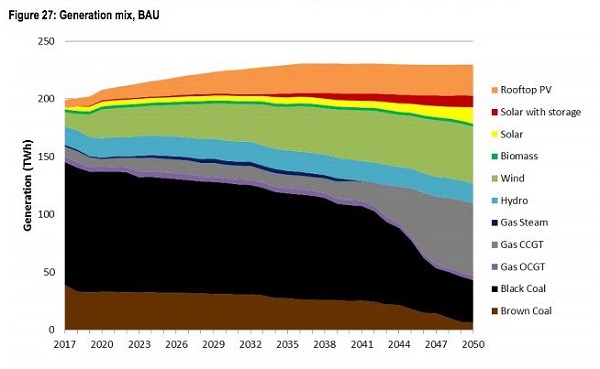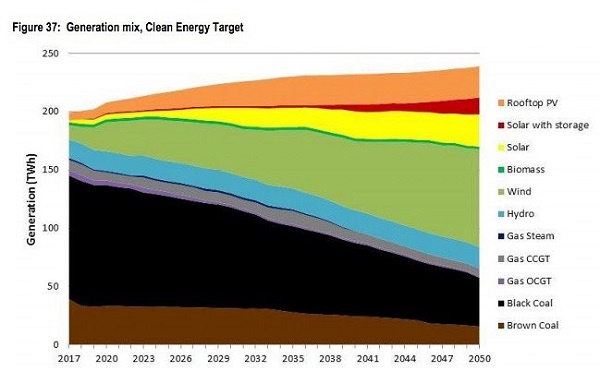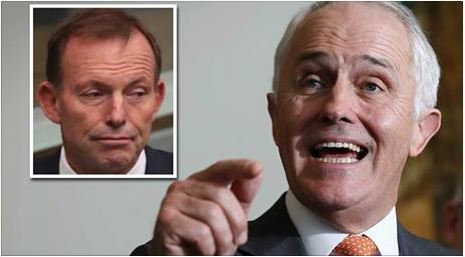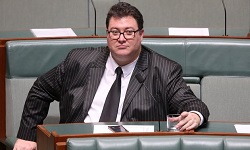In this post I meant to show how the science has been showing for years now that we need rapid and concerted decarbonisation for a safe climate, and any hope of keeping global warming to 1.5˚C, in order to frame a consideration of the Finkel review. However, Abbott’s climate denialism is dramatically on full show and now George Christensen has thrown a grenade into the ring by saying he won’t vote in favour of Finkel’s Clean Energy Target. He says that most other Nationals won’t vote for it either. Indeed:
- He said that, rather than legislating a clean energy target, the government would be better off building high-efficiency coal-fired power stations to replace the ageing coal fleet. Christensen contended that approach would reduce carbon pollution.
Indeed Finkel’s review, which was carefully crafted to meet the full range of views in the LNP including climate deniers, looks dead in the water.
Surely One Nation could not vote for a scheme that encourages renewables and does not fully embrace coal. It’s hard to see the Greens voting for scheme that does almost nothing over ‘business as usual’ to 2030 and smooths the path for coal so that in 2050 we would be burning more of it than in the BAU case. Here are three graphs which illustrate the problem:

Generation mix with BAU:

Generation mix with CET:

Those images are from the Jacobs Group modelling via The Guardian link above.
Labor could hardly endorse the future energy mix either, although you never know when politics will take priority over policy. Surely, on politics, they need to be aware of greenish inner city votes, plus there is a huge opportunity to wedge Turnbull. I do think Mark Butler understands the issues reasonably well and shows their possible hand when he said:
“You can’t rig the definition of clean energy to include new coal-fired power stations just to placate Tony Abbott and Barnaby Joyce.
“That would make a complete mockery of a very serious process that the chief scientist and his panel followed over months”.
Shorten says they’ll give Turnbull a hand if he stares down the “recalcitrants who have held back climate policy in this country for 10 years”.
It looks as though those recalcitrants won’t be moved, and Turnbull may delay the response until the LNP’s climate policies are reviewed. That review is in train now and due to be finished by the end of 2017.
From the critiques so far I think Finkel’s proposals are problematic for three reasons.
First, the modelling it’s based on is complete crap, according to RenewEconomy, who say it favours fossil fuels over renewables, solar in particular, and seriously underestimates distributed generation, especially rooftop solar with batteries.
Secondly, Finkel says that the CET is scalable, but Giles Parkinson says it isn’t if we seriously want to achieve the Paris commitments of 1.5˚C.
Thirdly, Finkel’s brief was not to meet Australia’s fair commitment to the Paris Accord, rather to facilitate the Turbull government’s explicit target of a 28% reduction of emissions by 2030 in the electricity sector.
Finkel cannot be blamed for the Turnbull government’s lack of ambition, or the rubbish modelling.
At least now the carbon dinosaurs have been flushed out into the open. This uncomfortable image illustrates Turnbull’s dilemma as he declares war on glibness:

To be honest personally I’ve only skimmed the Finkel review itself, available here. I heard Abbott has not actually read it. I’ll have a go on the weekend, meanwhile I’ll do a bit of a summary on what the science says in a separate post.
I did think Senator Arthur Sinodinos, Minister for Industry, Innovation and Science did well on the Finkel Review and the need to follow the science with due regard to risk when talking to Patricia Karvelas on RN Drive. Abbott, Christensen et al, however, will hold their ground.
By the way, Christensen, in my view, will at some stage jump ship and join his soul-mates at ON before the next election.


Christensen might cross the floor to benches vacated as ALP joins Coalition to support an amended Finkel based Bill.
Is removing Turnbull in Labor interests? PM seems keen to call the bluff of the Glib Group. Here’s an idea Mr Shorten: why not wedge Tony Abbott?
I don’t think Turnbull’s leadership is in play over this, and we are told that many in the LNP, including cabinet members who don’t like the CET, are completely fed up with Abbott.
Labor might play ball to look co-operative and in the hope of changing the system when they gain power. Given that no-one is really addressing the seriousness on what needs to be done, that is probably the best outcome under the circumstances.
The CET would need to be lifted to a point where it is almost meaningless not to exclude supercritical coal, but the market won’t touch the stuff. If the government does build new coal, they are in danger of pissing away huge funds on what may become (should become) stranded assets, and also risk being sued by green groups for endangering the planet and future generations, which is something I want to write about shortly.
Agree that compromise now may be best, least worst outcome.
BTW, we hear that Mr Christensen may join forces with NXT to modify Govt plans to lower penalty rates. On that score he would be at odds with ON, si?
Apologies if this comment should be on a different post, but I find this extremely heartening – using the infotech which underpins crypto-currency to create a peer to peer energy market. There’s more here.
Christensen also wants the government to get back into the construction and perhaps running of coal fired power stations – public authority socialism returns?
That is a beauty zoot, well worth keeping an eye on, thanks.
Free trade of electricity !
The only worry is what novel way Government will intervene and fuck it up.
Douglas, Bernard Keane at Crikey reckons Christensen’s approach is straight out of the old Soviet Union textbook.
Paula Matthewson, now writing for Crikey, thinks Abbott hates Turnbull so much he just wants to f*ck him up.
Phillip Coorey in the AFR says no-one is listening to Abbott apart from maybe Eric Abetz. The Liberals are listening to Angus Taylor, who is a smart guy and has cred because a couple of years ago he predicted the electricity prices would go through the roof, while Greg Hunt said they wouldn’t.
Taylor has always been a climate denier, and it seems he wants to solve the ‘climate’ problem by buying overseas carbon credits, which are currently going for $2 a tonne.
Matthewson thinks Shorten might rescue Turnbull. Surely not.
zoot thanks for that I’ll follow it up when I get time.
If it’s a choice of ‘rescuing the PM’ and making some (very small ) progress on CO2 emissions reductions, I’d take it.
My feeling is that Mr Shorten would gain the kudos, not the PM.
Meanwhile as discussed here a few months ago, citizens are busy installing rooftop solar, watching battery storage prices reduce, waiting for electric vehicles; a few are working on community energy hubs.
And the big banks are fleeing coal generation. Some large owners of power plants are too, e.g. Engie, Adani.
Not all action has to be Govt action.
But your main point stands. Progress has been too slow.
The most interesting thing today is that the Libs are fed up with Abbott to the point that his preselection is in question.
Stop the Wrecker.
Ditch the Snitch.
Get Thee to a Monastery.
Some people blame the massive power increases on Tony Abbot.
Sounds like a good theory
Who else would Verrender blame for everything ?
Situation normal.
Jumpy, do you think there is a possibility Verrender might be right?
I just heard that yesterday One Nation announced that they would be opposing Finkel and any scheme that had renewable energy as part of its solution.
For the Turnbull government that renders the senate crossbench irrelevant. Bipartisanship with Labor is their only hope.
Building of a new solar + storage installation due to start in Sept without support from the cola eaters.
Yes I saw that John and it’s pretty stunning. Now if Commonwealth policy fully embraced ventures like this and abandoned the fossil dreaming…
See Turnbull caves in, declares support for new “clean coal” generator.
With the Nowingi solar project I assume the ALP/green will be legislatively demanding that batteries and solar panels be manufactured by Australians in Australia under Australian wages and conditions regulations ?
And owned by Australians to get One Nation support ?
Jobs have to come from somewhere Jumpy. Why not the future?
There’s recently been talk of an offshore wind farm in Bass Strait. Advantages: relatively shallow waters to install towers in, reliable strong winds, nearby transmission lines to Melbourne from Latrobe Valley.
Unfortunately, a three year feasibility study; but State and local govts very keen. Victoria has relatively little wind generation as yet. We face the phasing out of brown coal electricity over the next – who knows? – five to fifteen years…..
Ambigulous we need an overall plan. Many of us thought Finkel might come up with such a plan.
Finkel recommends (which the government has to accept and then work through COAG) that the NEM be re-organised and then they develop a plan.
It’s a plan for a plan, in a context you could not say is ‘agile’, to use the current management buzzword.
Correct, Brian.
There’s slight change of emphasis, which is quite major.
Finkel pointed out today at the National Press Club that his review is being done for the COAG Energy Council, not the gubblement.
There is a tendency on the part of federal ministers to think they own meetings with the state ministers. They might have most of the money, but the states are proud and know where the authority lines are.
Yes, States authorise mining, organise electricity networks, set feed-in tariffs [ahem, looking at you, Mr Andrews], organise energy supplies for State schools, administer public service vehicle fleets, decide building regulations, control road and rail transport, ….
I had to help my brother, his son and granddaughter watch State of Origin last night. We won at the death, but it looked bad for much of the match!
Have to work today and tomorrow, probably Saturday, so forgive me, I’ll probably not get back to this interesting thread for a few days.